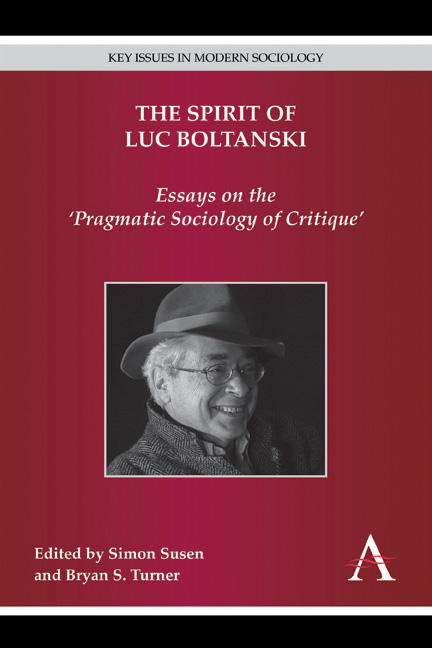Book contents
- Frontmatter
- CONTENTS
- List of Contributors
- Preface
- Part I Introductory Remarks
- Part II Luc Boltanski and (Post-) Classical Sociology
- Part III Luc Boltanski and Pragmatism
- Part IV Luc Boltanski and Critique
- 5 Is There Such a Thing as a ‘Pragmatic Sociology of Critique’? Reflections on Luc Boltanski's On Critique
- 6 Strengths and Limitations of Luc Boltanski's On Critique
- 7 A Renewal of Social Theory That Remains Necessary: The Sociology of Critical Capacity Twenty Years After
- 8 Enlarging Conceptions of Testing Moments and Critical Theory: Economies of Worth, On Critique, and Sociology of Engagements
- Part V Luc Boltanski and Critical Sociology
- Part VI Luc Boltanski and Political Sociology
- Part VII Luc Boltanski and Contemporary Issues
- Part VIII Luc Boltanski in Conversation
- Part IX Luc Boltanski and His Critics
- Index of Names
- Index of Subjects
7 - A Renewal of Social Theory That Remains Necessary: The Sociology of Critical Capacity Twenty Years After
from Part IV - Luc Boltanski and Critique
Published online by Cambridge University Press: 05 December 2014
- Frontmatter
- CONTENTS
- List of Contributors
- Preface
- Part I Introductory Remarks
- Part II Luc Boltanski and (Post-) Classical Sociology
- Part III Luc Boltanski and Pragmatism
- Part IV Luc Boltanski and Critique
- 5 Is There Such a Thing as a ‘Pragmatic Sociology of Critique’? Reflections on Luc Boltanski's On Critique
- 6 Strengths and Limitations of Luc Boltanski's On Critique
- 7 A Renewal of Social Theory That Remains Necessary: The Sociology of Critical Capacity Twenty Years After
- 8 Enlarging Conceptions of Testing Moments and Critical Theory: Economies of Worth, On Critique, and Sociology of Engagements
- Part V Luc Boltanski and Critical Sociology
- Part VI Luc Boltanski and Political Sociology
- Part VII Luc Boltanski and Contemporary Issues
- Part VIII Luc Boltanski in Conversation
- Part IX Luc Boltanski and His Critics
- Index of Names
- Index of Subjects
Summary
Luc Boltanski and Laurent Thévenot's De la justification (1991) and the subsequent research programme inspired by it, now known alternatively as ‘pragmatic sociology’ or the ‘sociology of critical capacity’ (Boltanski and Thévenot, 1999), have provided a radically new approach to sociological theory and research. The programme promised to break a deadlock in theoretical debate and open new avenues in key areas of sociological inquiry, not least historical and comparative sociology. Today, in my view, some of the potential has in fact been realized, but the renewal in social theory that should have been expected to follow has not, or hardly, occurred. The following reflections have three objectives: first, to define the project of the renewal of social theory that is at stake; second, to demonstrate why the ‘sociology of critical capacity’ has had the potential to make such a renewal possible; and, third, to provide some reasons why, today, this renewal remains necessary, despite the work that has already been accomplished.
More than twenty years ago, the publication of De la justification (first in 1987 and then in 1991 in a revised version with wider diffusion) led to a wide debate about the rising ‘new social sciences’ in France, seen early on as an approach that promised a radical renewal of social theory and research (see, for instance, Espaces Temps, 1992). Outside France, by contrast, the innovation remained largely unknown for a long time, owing not least to the late publication, in 2006 and 2007 respectively, of the English and German translations of this flagship work of the ‘sociology of critical capacity’ (for early presentations in languages other than French, see, for example: Wagner, 1993, 1994b). Currently, there is a lively debate about pragmatic sociology in English and German (see, for instance: Blokker, 2011; Diaz-Bone, 2011), whereas the research unit Groupe de Sociologie Politique et Morale (GSPM) in Paris, the institutional base of this approach, ceased to exist in 2013.
- Type
- Chapter
- Information
- The Spirit of Luc BoltanskiEssays on the 'Pragmatic Sociology of Critique', pp. 235 - 244Publisher: Anthem PressPrint publication year: 2014

